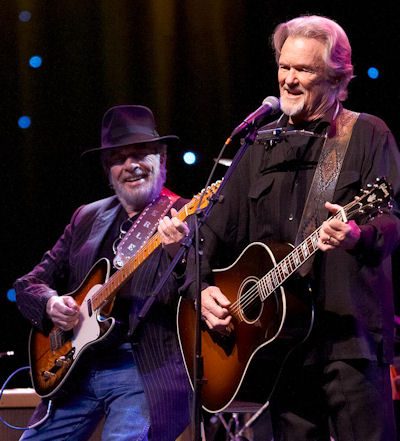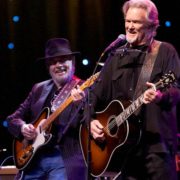MERLE HAGGARD AND KRIS KRISTOFFERSON AT THE SABAN
Merle Haggard and Kris Kristofferson at the Saban Theatre:
THE BEVERLY HILLBILLIES RIDE AGAIN – FEBRUARY 11, 2016
Due to pheumonia, Merle Haggard has checked into a CA hospital, forcing him to postpone.
11/13/2015
 Last year I celebrated my birthday with Merle Haggard at the Canyon Club in Agoura. Looks like it’s getting to be a habit; the Hag is going to help me make it through December this time around too; with a little help from Kris Kristofferson, former Rhodes Scholar and perhaps the most literate writer ever to lay claim to being a country singer. Between Merle and Kris there won’t be many country staples left untouched: drinking (Tonight the Bottle Let me Down, and Sunday Morning Coming Down); sad love affairs (Me and Bobbi McGee, Help Me Make It Through the Night); prison (Mama Tried); Hard Times (Workingman’s Blues and Here Comes That Rainbow Again); Patriotism (The Fightin’ Side of Me); and Jesus (They Killed Him)—between them a veritable glossary of country music.
Last year I celebrated my birthday with Merle Haggard at the Canyon Club in Agoura. Looks like it’s getting to be a habit; the Hag is going to help me make it through December this time around too; with a little help from Kris Kristofferson, former Rhodes Scholar and perhaps the most literate writer ever to lay claim to being a country singer. Between Merle and Kris there won’t be many country staples left untouched: drinking (Tonight the Bottle Let me Down, and Sunday Morning Coming Down); sad love affairs (Me and Bobbi McGee, Help Me Make It Through the Night); prison (Mama Tried); Hard Times (Workingman’s Blues and Here Comes That Rainbow Again); Patriotism (The Fightin’ Side of Me); and Jesus (They Killed Him)—between them a veritable glossary of country music.
But what makes both Merle and Kris standout even from other country classics is their willingness to bend the conventions of country music, to raise questions about an unpopular war (Haggard’s That’s the News about Iraq); to speak truth to power (Kristofferson’s Don’t Let the Bastards Get You Down) and to look at themselves with a sense of humor (Hag’s admission to smoking marijuana after writing Okie From Muskogee). They are both supremely independent artists who have followed their own road and dealt with adult problems of aging (Haggard’s well-publicized heart trouble and the 79 year-old Kristofferson’s uncertain memory). Their audiences can trust them to face whatever life has thrown at them with grit, honesty and the soul of a poet. Country music is ennobled by their presence.
They also share one other significant bond: Johnny Cash’s central role in the beginning of both their careers. It was Johnny Cash who inspired Merle Haggard to become a country singer by performing at San Quentin Prison when Hag was locked up for robbery as a young adult, and saw a role model of what he now realized he wanted to do with his life. Johnny Cash at Folsom Prison was the more famous concert and record, but Hag was locked up at San Quentin, not Folsom, and Cash’s performance there changed his life.
https://www.youtube.com/watch?v=_OLwITWWTYA
Kristofferson’s debt to Cash was more whimsical and more direct: working as a janitor in Nashville he tried any number of ploys to get his songs heard by music publishers, who might get them to the right singer, but when all else failed he decided to go right to the source; the singer he most wanted to record one of his songs. He hired a helicopter and flew right over Johnny Cash’s home in Hendersonville right outside of Nashville and dropped out of the chopper in a parachute with a briefcase full of his manuscripts. Cash, who thought he had seen it all, had never seen this kind of bravado before, and invited the young songwriter in and listened to his songs. Sunday Morning Coming Down became Cash’s first cover of a Kristofferson song, and a major hit. Along with Janis Joplin’s recording of Me and Bobbi McGee, his career was launched. He could finally afford to send his cleanest dirty shirt to the cleaners.
Kristofferson became a member of the Highwaymen—Cash’s career-enhancing quartet with Waylon, Willie and Kris in the 1980s; and gave a great performance to Kristofferson’s Grapes of Wrath-inspired song Here Comes That Rainbow Again, adapted from one key diner-scene in the novel in which the lady owner gives some candy to some impoverished children who can’t afford to pay—only to find that two truckers left her some change to cover the expense. It’s a small vignette and a moving song, with Cash’s deep bass reaching down to the core of humanity to express Steinbeck’s secular faith.
Now that both Cash and George Jones are gone, it looks like Haggard has inherited the mantle of greatest country singer alive—since Willie is more of a talker than a singer. No one touches the range of Hag’s Oklahoma sensibility—from the Midwest flatness of a Woody Guthrie-like paean to the workingman in Workingman’s Blues to the heart-felt country prison song classic Mama Tried—painting the very scene in which he first heard Cash perform:
I turned 21 in prison doing life without parole
No one could steer me right but Mama tried, Mama tried
Mama tried to raise me better, but her pleading I denied
That leaves only me to blame ’cause Mama tried
But what makes both Haggard and Kristofferson appeal to me so deeply forty years after their biggest hits have become golden oldies is that they have spent the latter part of their careers exploring new songwriting territory and now clearly transcend the genre that gave them their early fame. In my frame of reference they have both become folk singers; Haggard taking on the war in Iraq in more than one late song—and leaving the typical country patriotic bromides he used to sell to share the adult sense of outrage at the folly of war—and this war in particular; and Kristofferson becoming a part of the protest against US policies in Latin America—propping up one dictatorship after another—from Chile to El Salvador. Don’t Let the Bastards Get You Down, Kris sang in one particularly trenchant song from his album Third World Warrior, using a quote I first heard from John Wayne to better effect than the Duke. And his album Closer to the Bone reached out to anyone just struggling not to give up on life.
No other country singer alive would have leant their name and prestige to a fundraiser for the local Office of the Americas, a radical resistance group founded by a defrocked priest and nun from Latin America Blase and Theresa Bonpane—who chose love of man in all its manifestations to love for God. They have been supporting liberation movements in Central and South America ever since the 1973 coup in Chile—the one funded by our own CIA that brought down elected Democratic Socialist Salvador Allende and led to the torture and murder of folk singer Victor Jara in the Estadio Chile. In December 2000 Kristofferson was their featured entertainer for their annual benefit—which helped to fund their on-going campaign against the School of Americas in Fort Benning, Georgia, and which they have been trying to close as the “School of the Assassins” for thirty years, where leaders of the Nicaraguan Contras and El Salvadoran Death Squads (La Muerte) were trained.
As a long-time friend of the OOA, I was fortunate enough to be on the same program with Kristofferson and had just finished writing my Dylan parody on the presidential election, Punch It Twice (about the butterfly ballots in Palm Beach County), which I performed in public there for the first time. When I finished the song Kristofferson looked up from the first row and smiled with this comment: “Altman, you’re one damn funny son-of-a-bitch!” No one has ever paid me a nicer compliment. Thank you, Mr. Kristofferson!
Haggard and Kristofferson clearly enjoy each other’s musical company, and Kristofferson enjoys being accompanied by Haggard’s great band The Strangers. The last time they appeared together in concert was at the Greek Theatre a few years ago. I can’t imagine a better way to spend my birthday than to see them together again at the Saban Theatre, “Beverly Hills Temple of the Performing Arts.” Last year Haggard performed solo (though backed up by The Strangers) at the Saban’s sister venue, The Canyon Club in Agoura Hills—also on my birthday. It was the first time I saw Haggard in concert and it was as good as my review said it was—it was great. So I couldn’t be more delighted to be able to celebrate my birthday again with two great American artists—whose songs I have been singing for longer than I can remember. Getting older isn’t as bad as it’s cracked up to be, not when two great performers like Merle Haggard and Kris Kristofferson can sing me back home and help me make it through the night. Sounds like a party. The Beverly Hillbillies ride again!
Merle Haggard and Kris Kristofferson appear in concert at The Saban Theatre in Beverly Hills Wednesday December 9 at 9:00pm. See their website for tickets; doors open at 6:00pm; show at 9:00pm.
Friday November 20 at 8:00pm Ross commemorates the Centennial of the execution of Labor’s greatest troubadour Joe Hill at Beyond Baroque Literary Arts Center, 681 Venice Blvd, Venice, CA 90291 310-822-3006; $10.
Sunday evening December 20 at 7:00pm Ross Altman and a Small Circle of Friends celebrate Phil Ochs 75th birthday with a concert of his songs at Beyond Baroque Literary Arts Center, 681 Venice Blvd, Venice, CA 90291 310-822-3006; $10.
Los Angeles folk singer Ross Altman has a PhD in Modern Literature; Ross can be reached at greygoosemusic@aol.com













